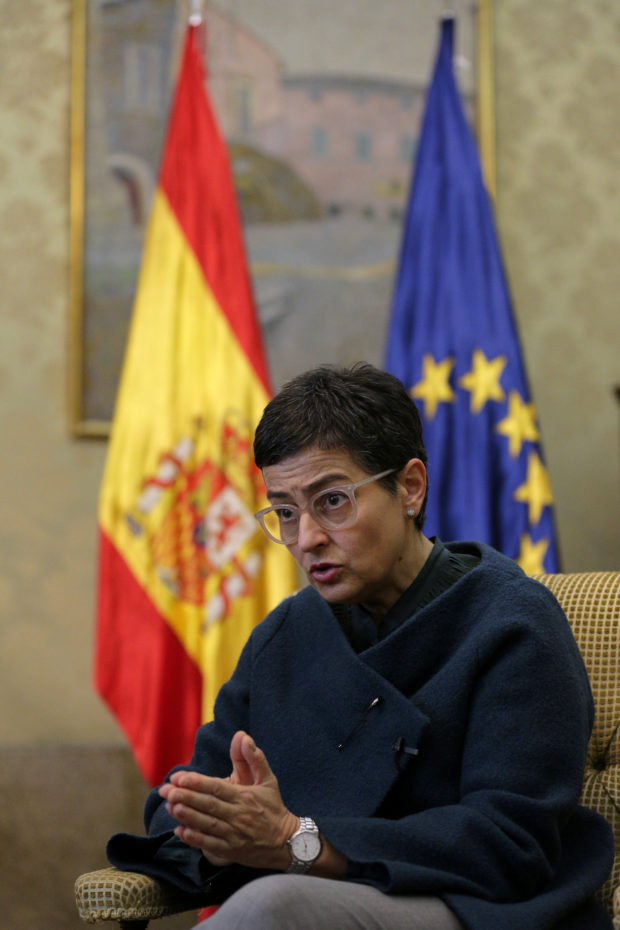Spain eyes trade, defense talks ahead of US state visit
MADRID — Spain won’t use its defense cooperation with the United States as leverage in its push against tariffs on European products, the Spanish foreign minister said on Wednesday ahead of a visit to Washington that aims to end the loss of business by Spanish producers of wine, olives and their oil.

Spanish Foreign Minister Arancha Gonzalez during an interview with The Associated Press at the at the Spanish foreign ministry in Madrid, Spain, Wednesday, March 11, 2020. Spain is not dangling its defense cooperation with the United States as leverage in its push against tariffs on European products, the Spanish foreign minister said on Wednesday ahead of a visit to Washington that aims to end the loss of business by Spanish producers of wine, olives and their oil. (AP Photo/Manu Fernandez)
But Arancha González Laya said both defense and trade — including the one-billion-dollar (930 million euros) worth of Spanish exports hit by last year’s U.S. tariffs — will feature high in her agenda next week when she paves the way for a royal state visit in April.
“We’ll look at the differences, and we’ll do it the way two partners do: Talking about it, preferably discreetly,” she told The Associated Press.
González Laya recently took the reins of Spain’s diplomacy in a new left-wing coalition government.
The U.S. wants to expand significantly its presence in two bases in southern Spain, which are used as a stepping stone for operations in Africa and the Middle East.
González Laya, a seasoned bureaucrat with previous jobs in the U.N. and the World Trade Organization, made headlines earlier this year when she suggested that the future presence of the U.S. military there would become part of other negotiations with its long-time ally.
Article continues after this advertisementThat, seen as aimed at applying more pressure on the trade front, marked a U-turn in Spain’s approach to the presence of the U.S. Air Force and Navy in Morón and Rota. In the past, the bases were kept aside of the ups and downs in diplomatic relations, even when those hit a low with the pull-out of Spain’s troops from Iraq in 2004.
Article continues after this advertisementGonzález Laya said Spain and the U.S. “have common defense and security relations that we are interested in strengthening, and we both have bilateral economic and commercial relations that we are also interested in strengthening.”
But the bases won’t be used as leverage in any negotiation, she said. “That’s not how relations between two mature partners have to be approached.”
The Trump administration has also recently toned down its previous criticism of Spain as one of the European countries that are failing to contribute enough to NATO funding.
González Laya said Spain wants to increase military spending, but also to focus it on “strengthening” European defense capabilities, which also means supporting a homegrown defense industry.
The Spanish minister is scheduled to meet her counterpart, U.S. State Secretary Mike Pompeo, on March 16. She and Spanish Trade Minister Reyes Maroto will also be seeing U.S. Trade Representative Robert Lighthizer.
The visit will continue in the White House, with National Security Adviser Robert O’Brien and Donald Trump’s son-in-law and adviser Jared Kushner, to iron out preparations for the administration’s third state dinner, on April 21, hosting Spanish King Felipe VI and Queen Letizia.
The black-tie dinner is usually reserved for the country’s staunch allies, as the U.S. president and first lady Melania Trump did for France in April 2018 and Australia in September 2019.
González Laya, who described relations between the U.S. and Spain as those of “strategic partners” with an “enormous interdependence,” said that the situation in Venezuela would likely be touched during next week’s meetings.
The U.S. and Spain, she said, “can work together in the common goal of holding free, democratic and transparent elections in Venezuela.”